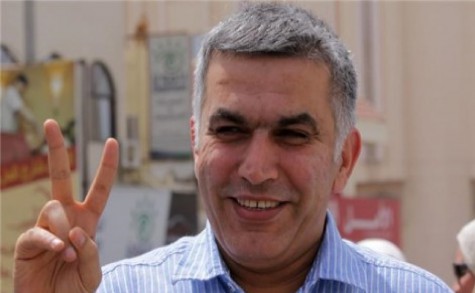 Prominent Bahraini human rights defender Nabeel Rajab was back in court this week on two cases related to tweets and media interviews about human rights violations in Bahrain, for which he faces 18 years in prison. His next hearings are on 07 March and 22 March 2017. He faces additional years in prison on other cases.
Prominent Bahraini human rights defender Nabeel Rajab was back in court this week on two cases related to tweets and media interviews about human rights violations in Bahrain, for which he faces 18 years in prison. His next hearings are on 07 March and 22 March 2017. He faces additional years in prison on other cases.
Rajab is the Founding Director of the Gulf Centre for Human Rights (GCHR), co-founder and President of the Bahrain Center for Human Rights (BCHR), Deputy Secretary General of FIDH from 2012 to 2016, and a member of the Middle East advisory committee at Human Rights Watch.
Rajab appeared in court on 21 and 22 February 2017 for hearings on charges of “offending a foreign country” (tweeting about the Saudi-led coalition airstrikes in Yemen) and “offending national institutions,” for comments about the alleged torture of inmates in Bahrain’s Jaw Prison in March 2015. He was first arrested on 02 April 2015 on these charges, but received a royal pardon for health reasons and released on 13 July 2015. On 13 June 2016, he was arrested for the televised interviews. During his detention in relation to the televised interviews’ investigation he was referred for trial in the criminal court in relation to the Yemeni war tweets.
Following a brief hearing on 21 February, the trial for the tweets was held over a day to hear video testimony as evidence that Rajab operates his own twitter account – the central fact in the case. He also appeared in court briefly on 23 January 2017 in this case, for which he’s facing 15 years in prison. The court postponed the next trial until 22 March in this case.
On 28 December 2016, Manama’s Fifth High Criminal Court acceded to an application for Nabeel Rajab’s temporary release following a failure to give any basis or any sufficient evidence of a link between him and the Twitter account with respect to the Yemeni and Jaw prison tweets.
However, that same day, on 28 December 2016, Rajab was immediately taken into custody on the investigation in relation to interviews dating back to 2015 and January 2016 with television networks which support the Bahraini opposition.
The GCHR, the Observatory for the Protection of Human Rights Defenders (FIDH-OMCT), the Arabic Network for Human Rights Information (ANHRI) and Front Line Defenders mandated a joint trial observation mission for the twitter case on 28 December. See: http://www.gc4hr.org/news/view/1460
Rajab was also in court on 21 February 2017 in the media interviews case, and next scheduled to appear on 7 March for this case. He faces three years in prison for charges of “spreading false news” for telling news outlets that journalists and NGOs are barred from entering Bahrain – despite that fact that GCHR and many other NGOs as well as the UN Special Rapporteur on Torture have not been permitted to enter the country since 2011.
In September 2016, an additional investigation was initiated against Rajab following the publication on 05 September 2016 of an Op-Ed in “The New York Times” with his by-line, which discussed the conditions of his imprisonment and arrest. The pending charge of “intentionally broadcasting false news and malicious rumours abroad impairing the prestige of the State” carries an additional one-year prison term if he is convicted.
GCHR reiterates its appeal to the government of Bahrain to:
Immediately and unconditionally release Nabeel Rajab and drop all charges against him, as well as removing his travel ban;
Uphold international legal standards including ensuring that technical experts are independent; and
End all forms of reprisals against human rights defenders and other activists in Bahrain, including travel bans, to which they have been subjected in violation of their rights to freedom of assembly and freedom of expression.
GCHR respectfully reminds you that the United Nations Declaration on the Right and Responsibility of Individuals, Groups and Organs of Society to Promote and Protect Universally Recognized Human Rights and Fundamental Freedoms, adopted by consensus by the UN General Assembly on 9 December 1998, recognises the legitimacy of the activities of human rights defenders, their right to freedom of association and to carry out their activities without fear of reprisals. We would particularly draw your attention Article 6 (c): “Everyone has the right, individually and in association with others: (c) To study, discuss, form and hold opinions on the observance, both in law and in practice, of all human rights and fundamental freedoms and, through these and other appropriate means, to draw public attention to those matters“, and to Article 12 (2): “The State shall take all necessary measures to ensure the protection by the competent authorities of everyone, individually and in association with others, against any violence, threats, retaliation, de facto or de jure adverse discrimination, pressure or any other arbitrary action as a consequence of his or her legitimate exercise of the rights referred to in the present declaration.”
Surce: GCHR




